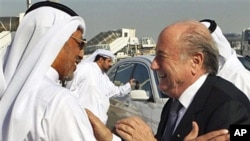Mohamed bin Hammam of Qatar, the head of the Asian Football Confederation (AFC), is supporting the idea of moving the 2022 World Cup in Qatar to the winter months to avoid the desert's summer heat. But the issue is far from being settled.
Through an interpreter at the Dubai International Sports Conference in the United Arab Emirates, Bin Hammam said Tuesday his country is capable of organizing the 2022 tournament in June and July.
"They have actually presented the solution for heat challenges, so our country actually [is] ready and willing to host a very comfortable World Cup in the summer season," he said through an interpreter.
However, Bin Hammam, who is also a member of the football world governing body's (FIFA) executive committee, says it would be better to play when the weather is cooler, because the players would be in better shape and not exhausted from a long season. He added that it is premature to suggest co-hosting the tournament with other countries in the region.
European teams appear to be split on whether it is a good idea to shift the tournament to a cooler time of the year. England national team coach Fabio Capello says the heat would force his team to spend most of its time in the hotel.
"It is a big problem because when you stay together for a long time you need to relax, to do something different, not only [go] to training or to play. For that reason I think the good idea will be to play in January or February," said Capello.
But Sandro Rosell, president of Spanish football powerhouse FC Barcelona, says the move would be disruptive and force some of Europe's top leagues to change their schedules.
"I have to defend to play in June and July because I don't like to break the Spanish league because it is one of the leagues in Europe that has continuity during January," said Rosell.
FIFA awarded the 2022 World Cup to Qatar earlier this month, beating out the United States, Australia, Japan and South Korea. But the decision prompted protests from numerous football organizations concerned about playing in temperatures that routinely exceed 40 degrees Celsius.
News
AFC Chief Backs Moving 2022 World Cup to Winter




